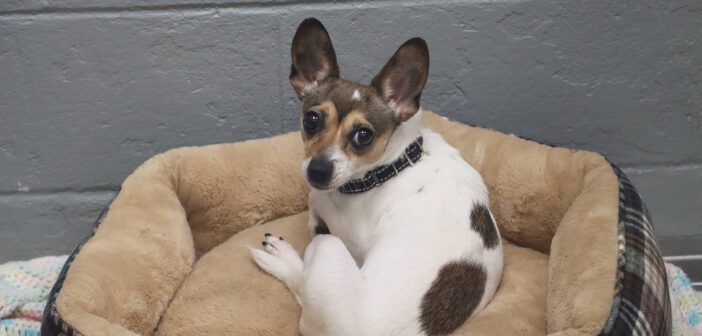Pets are ever-present lights in many homes, bringing comfort to their owners in times of need, amusing them and jumping for joy when they get home at the end of the day.
But who’s there for the pets that don’t have a place to call home?
The Lehigh Valley Humane Society has been the primary safe haven for animals in the Lehigh Valley for the last 119 years, providing housing for homeless animals, offering affordable pet care for owners and rehabilitating pets to be adopted.
The humane society has 91 dog kennels, 150 cat beds and additional space for small animals such as rabbits and guinea pigs. Stephanie Skyriotis, the community events coordinator at the humane society, said the shelter typically operates at near full capacity.
As a nonprofit organization, the humane society relies on partners, such as Best Friends Animal Society, which offers financial assistance and resources for the shelter’s trap, neuter and release program for cats in the area.
The organization has also been designated as a no-kill shelter by Best Friends, with a 93% total pet life-saving rate in 2024.
A team of dedicated employees and passionate volunteers makes that possible.
Skyriotis said growing up around horses sparked her love for animals.
“I just always had something in my heart for (animals),” Skyriotis said. “I felt like they couldn’t take care of themselves, and they count on people to help them.”
The society’s mission is to provide a sanctuary to homeless animals, and Skyriotis said this begins before animals enter their doors.
She said the community vet clinic at the humane society provides affordable pet care for financially-strained owners. This helps prevent overcrowding, as owners who can’t afford vet treatment often have no choice but to surrender their animals to the shelter.
Skyriotis said in 2024, the society gave more than $240,000 in financial assistance to Lehigh Valley pet owners by coordinating payment plans and keeping costs as low as possible for families.
“We’ve also helped families with medicines and even some with food,” she said. “Really whatever we can do to keep an animal in their home, we’re really going to try our best.”
Despite this aid, the shelter is overwhelmed with surrender requests, typically receiving around 20 per day, Skyriotis said.
Jahnessa Brooks, the enrichment coordinator at the humane society, said some people are surprised to find out the surrender process isn’t immediate.
Brooks said people surrender pets of all ages, from puppies and kittens to senior animals. Some owners are unable to keep their pets due to behavioral issues, which are often seen in adolescent dogs who can become destructive without sufficient training.
Due to capacity limitations, Brooks said, the shelter carefully selects which surrender requests to accept first based on available space and adoption potential.
The shelter will often accept young and more favorable dog breeds first, as these animals tend to get adopted quickly, usually in just a few days. She said this frees up space for remaining requests, including older dogs and less popular breeds.
“When they find out that there’s a little bit of a surrender process and (we) can’t always take (animals) on the spot, that’s when they may go towards dumping them,” Brooks said.
Despite limitations, she said they do their best to make space for all surrendered animals.
Many cases involving the surrender of pets in the Lehigh Valley stem from backyard breeders and puppy mills — people who breed dogs for profit.
This is an unethical breeding process, as backyard breeders and puppy mills often breed unhealthy animals due to poor care, over-breeding and genetic issues, according to the American Society for the Prevention of Cruelty to Animals. They also seldom have the resources to care for unsold puppies.
“They (backyard breeders and puppy mills) don’t have the resources to feed them, they don’t have the resources to vet them, and they bring them to us when they’re unable to sell them,” Brooks said. “The Christmas before last, we had a litter of puppies dumped in a tote outside our doors.”
Skyriotis said in emergency situations, when a large number of animals are surrendered, the shelter sets up for overflow. These cases often involve abandoned puppy litters or animal hoarding intakes.
In these situations, staff members place dog kennels behind the front desk and in offices. Skyriotis said they also create space for up to 40 cats in pop-up cages in a back room.
The humane society then searches for stable homes for these animals.
Skyriotis said it’s important to make sure the animals don’t end up back at the shelter. To ensure proper placement, she said, hopeful adopters must fill out an application and attend a meet-and-greet before taking a pet home.
Additionally, people who already own pets are required to bring them to the meet-and-greet to ensure both animals will get along.
Although the humane society regularly schedules meet-and-greets with their dogs, Skyriotis said many people don’t want to adopt certain breeds, especially pit bulls.
At any given time, Skyriotis said pit bull mixes make up about 90% of the shelter’s dog population as they are overbred in the area, and there is a stigma surrounding their temperament. Due to this, she said people are less likely to adopt them.
Skyriotis said smaller shelters, particularly in Allentown, usually won’t take pit bulls, as they tend to be less “adoptable” than other breeds.
“We try to break that stigma because most dogs are adoptable to the right family,” she said. “We’re happy to take the pit bulls, and we know that their stay here is going to be longer.”
Skyriotis said staff members have found pit bulls tied outside their doors and brought in without microchips or collars.
In extreme cases, Skyriotis said they can be referred to the shelter’s humane officer, who investigates cases of animal cruelty in the Lehigh Valley.
Staff members also pick up loose animals reported in the area. They respond to calls from 7 a.m. until 11 p.m., and the Allentown Police Department has access to their night drop kennels for cases outside these hours.
Brooks, one of the employees who responds to reports, said some animals are difficult to catch.
“There have definitely been times where we have to go out and play hide-and-seek with a dog,” Brooks said. “We have to go out with nets and six staff members to try and corner them.”
While employees, like Brooks and Skyriotis, play a vital role, the shelter also relies heavily on volunteers to operate. Before her current position, Skyriotis was the volunteer coordinator.
“Volunteers are really, really important and essential in working the operation,” she said. “Having volunteers come in and work with our dogs, doing enrichment, socializing with cats, doing the dishes, laundry, helping out when we’re short-staffed, is so extremely important.”
On a typical day, there can be up to 20 volunteers at the shelter. Skyriotis said more people volunteer in the spring and summer. The humane society saw 500 people spend a combined 6,190 hours volunteering in 2024, according to their annual impact statement.
One of these dedicated volunteers shows up to walk dogs no matter the weather. Lynn Reber, a Bethlehem resident, has been dedicating time to the humane society for six years.
She said she has a special love for pit bulls and enjoys walking as many as possible during the two days a week she volunteers. She is also currently fostering a pit bull from the shelter.
She said she often sees the same pit bulls at the shelter for months at a time.
“It’s hard to see them, especially the ones that have been here for a long time,” Reber said. “That really bothers me. I can’t really do anything about it, and there’s more that keep coming in. It’s kind of a never-ending influx.”
The humane society is committed to being “the leading advocate for breeds such as pit bulls that often are left behind or ignored by other shelters,” according to its website, which is just one of the cycles the humane society is working to break.






Comment policy
Comments posted to The Brown and White website are reviewed by a moderator before being approved. Incendiary speech or harassing language, including comments targeted at individuals, may be deemed unacceptable and not published. Spam and other soliciting will also be declined.
The Brown and White also reserves the right to not publish entirely anonymous comments.